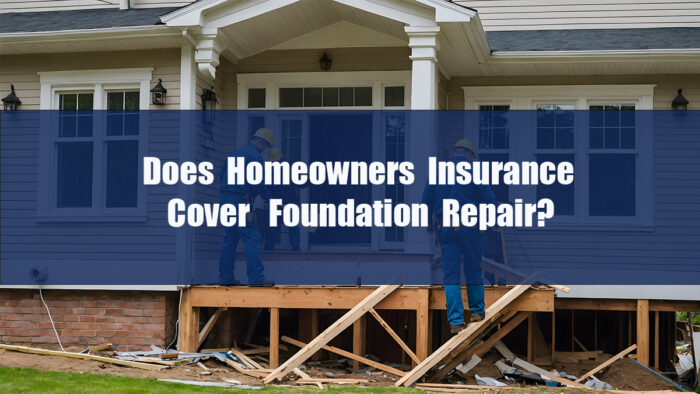The foundation of a home is the most important structure, as it is the bedrock where your house rests, and any issue can cause structural problems, possible harmful living conditions, and even reduce the value of the property. This shows the importance of maintaining a good and strong foundation, and a lot of homeowners find themselves wondering: Does homeowners insurance cover foundation repair? Amazing question. Well, you are about to find the answer in this article.

Does Homeowners Insurance Cover Foundation Repair?
The answer to this question is no. Homeowners insurance does not usually cover foundation repair if the damage is from earth movement, wear and tear, or settling. This is because they are seen as events that need a separate policy or are maintenance issues.
For instance, flood or earthquake insurance. If a sudden and accidental event that is under your quote causes the foundation to be damaged, like water damage from a burst pipe, the repair might be covered by your insurance company.
What Type of Foundation Damage Does Home Insurance Cover?
Homeowners insurance will offer coverage for foundation damage if it is caused by the following events:
- Vandalism or malicious mischief: If someone damages your foundation intentionally, this is often covered.
- Water Damage from Plumbing: If there are any sudden plumbing issues or leaks that cause your foundation to be damaged, you will receive coverage. However, poor maintenance and damage from gradual leaks are not included in the coverage.
- Explosions: Damages to the foundation of your home caused by the explosion will likely be covered in your insurance quote.
- Vehicle or Aircraft Accidents: If an aircraft or a vehicle crashes into your home and damages the foundation, your insurance policy can reimburse it.
- Fire and Lightning: Fire and lightning are perils in your homeowners insurance that will be covered if they cause damage to your home’s foundation.
When Will I Not Receive Coverage?
There are many scenarios where your homeowner’s insurance quote does not cover foundation repairs, and they include:
- Poor Construction: Any issue with the original or initial material or construction will not be covered.
- Earth Movement: Destructions from earthquakes, landslides, or sinkholes usually need separate and standalone policies or endorsements.
- Flooding: Flood damage is not covered by a standard homeowners insurance policy. This means that you will need a separate policy for this issue.
- Normal Wear and Tear: Gradual breakdown, settling, or cracking that happens over time is not usually covered as a part of your policy.
How to File a Claim for Foundation Damage
If your foundation is damaged and you are sure that the suspected peril is part of your policy’s coverage, here are the steps you need to take to file a claim:
- Take a Record of the Damage: You can document the damage by taking videos or photos of the damage as well as other contributing factors.
- Review your policy: Check your deductibles, policy coverage, and requirements before filing a claim.
- Contact Your Insurance Company: As soon as you find the damage, contact your insurance provider to report the damage.
- Prevent Further Damage: Take fast and cautious steps to avoid any further damage while your claim is being processed.
- Assessment: Your insurance provider might send an adjuster to evaluate the damage and find out if the damage is covered by your quote.
- Keep Records: More importantly, keep a well-detailed record of your discussion and agreement with your insurance company.
Signs of Foundation Damage
It is important to recognize the early stages and signs of damage to your foundation. This not only helps you stop things before they get really bad, but it also saves you money and stress. Here are some of the common signs of damage to your foundation:
- Bulging walls.
- Water damage.
- Cracks in the exterior.
- Cracks in walls or floors.
- Windows and doors will not close properly.
- Uneven floors.
- Spaces between wall seams or between walls and the ceiling.
How to Prevent It
Although not all foundation damage can be avoided, especially if it involves extreme weather events and shifts in the earth, here are some precautions and things you can do to reduce the possibility of experiencing one:
- Landscaping cautiously.
- Maintain proper drainage.
- Checking the soil moisture.
- Routine inspections.
- Maintain a stable temperature.
- Repair leaks immediately after detection.
Pay attention to these signs for damages and follow the right precautions to avoid them. As a homeowner, you need to prevent expensive repairs and safeguard your home.



